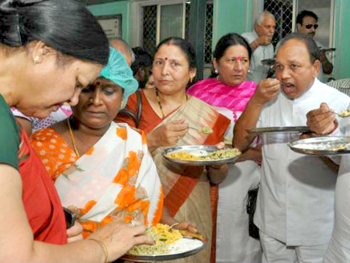
New Delhi, Jan 18: Female canteen employees in central government departmental canteens who wear sarees will get a 'petticoat' while those who don salwar kameez will be given a 'dupatta'.
"The matter regarding issue of uniforms to entitled female canteen employees has been reviewed and it has been decided to authorise issue of petticoat to entitled female canteen employees who wear saree and dupatta to those who wear salwar kameez in addition to already authorised articles of uniforms," said an order issued by the Department of Personnel and Training (DoPT).
At present, specified categories of canteen staff are being provided with the articles of uniform as per the administrative or functional requirements.
The pattern and scale (quantity) entitlement of uniforms being provided to the canteen employees is in accordance with their service conditions, nature of duties and responsibilities, as per existing norms.
They are also eligible for grant of washing allowance at the rate of Rs 30 per month.
As a measure of staff welfare, departmental canteens and tiffin rooms have been set up in the central government offices to make available beverages, snacks and meals prepared in hygienic conditions, to the employees during the working hours at reasonable rates.
There are 1,000 non-statutory departmental canteens and tiffin rooms functioning in various offices of the central government






Comments
As I've been resolving the book, I'm realizing that altering my own state of mind is the biggest obstacle.
Acquiring time liberty isn't really so much a matter
of discovering a method to make money with very little time financial investment-- there
appears to be a lot of way to do that. It's actually about the process of liberating myself
from my own inherent concepts about the relationship between time and money.Judging from the success of this blog site and the book, I'm not the only one struggling with this.
Thanks for blazing a trail, Tim.LikeLike
my web page - icbc cases: http://www.google.com
Add new comment